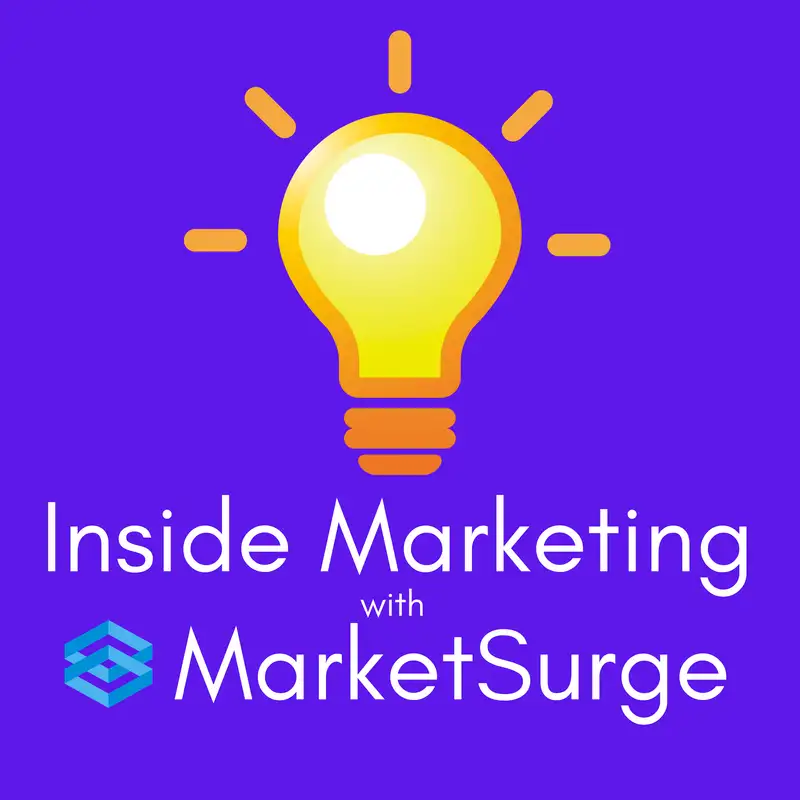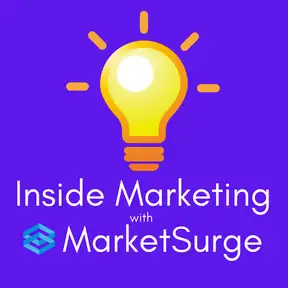AI is Eating Marketing Alive — Here’s What You Missed This Week June 27 2025
Welcome to Inside Marketing
With Market Surge.
Your front row seat to the
boldest ideas and smartest
strategies in the marketing game.
Your host is Reed Hansen, chief
Growth Officer at Market Surge.
Good morning.
Uh, I hope you're all doing well.
I am sore this morning.
I.
Just got back from a vacation
in Europe, uh, in London
specifically, and I was worn out.
I dunno if you ever go on vacation
and think, gosh, I gotta do better.
Uh, I gotta be in better
shape or gotta look better.
Um, well, that always happens to me.
I, and I came back and thought,
man, I should start running again.
My legs are just not where I
want them to be in terms of
being able to stay on my feet.
Uh.
And so I have been running for
two days in a row, which is
I think, an accomplishment,
relatively speaking for me.
And I am sore.
Don't worry.
I, um, I only ran three miles across
the two days, but I am feeling
like I accomplished something
because my body is screaming.
Well, welcome to Inside
Marketing with Market Surge.
I'm your host, Reed Hanson, and today
we're diving deep into one of the most
important, most transformative, and
let's be honest, most confusing topics
in the marketing world right now.
How AI ads and algorithms are completely
flipping the script on how we do business.
Whether you're a business owner, marketer.
Consultant or just someone trying to make
sense of how AI is changing the game.
You are absolutely in the right place.
In this episode, we're
going deeper than headlines.
We're unpacking what's happening
behind the scenes, the big shifts, the
subtle shifts, the cultural impacts,
and most importantly, what this all
means for you and your business.
So here's what's on deck today, how
AI is gripping marketing at a global
scale, and why it feels like everyone's
sprinting towards ai, but not everyone
knows where the finish line is.
Why traditional SEO
might actually be dying?
Yeah.
We're saying that out loud.
Whether AI in ads is a productivity
hack, a creativity killer, or maybe both
the controversy behind a viral campaign
telling businesses to stop hiring humans.
Yeah, it's as wild as it sounds.
How AI bias is creeping into
marketing and why that's not just a
tech problem, but a human problem.
And finally, the debate
heating up in boardrooms and
creative studios everywhere.
Can AI truly replace human creativity?
So buckle up and we'll kick this off.
So let's talk about
AI's Grip on marketing.
We'll set the scene at the
Can Leon, arguably the Oscars
of the marketing world.
71% of the CMOs reported that they're
investing over $10 million a year into ai.
That's a huge jump from
57% the year before.
This isn't hype anymore.
This is the reality.
Now, why are they doing that?
Because AI isn't just a shiny toy.
It's a tool that's reshaping how we
optimize workflows, hyper-personalized
campaigns, and extract consumer
insights in ways we couldn't
have imagined five years ago.
AI can write, copy, generate
images, predict customer behavior,
and even schedule meetings.
But here's the kicker.
Despite all this, many marketing leaders
are still struggling to see scalable,
ROI, the tools are here, the excitement
is real, but the systems to use these
tools effectively are still catching up.
Are we moving faster than
our ability to implement?
Are we prioritizing AI because it's
necessary or just because we think
we don't want to be left behind?
Think about that.
It's the classic technology adoption
curve playing out in real time.
And here's where culture
starts to intersect.
Inside teams, you're seeing
tension between the creatives
and the data-driven folks.
AI is forcing marketers to become part
artist and part analyst, and let's be
real, not everyone's ready for that blend.
There's also a shift
in client expectations.
Businesses are expecting faster
turnaround times, more personalized
campaigns, and real time insights.
If your agency or business isn't
leveraging ai, you risk looking outdated.
But let's pause here and talk
about the dual nature of ai.
AI can be an incredible force for good.
It democratizes marketing.
It allows small businesses
to compete with the big guys.
It can reduce busy work,
it can free humans to focus
on strategy and creativity.
It personalizes the customer
experience in ways that weren't
possible even a few years ago.
However, on the flip side,
AI can perpetuate biases.
It can spread misinformation faster
than ever, and depersonalize the
very experiences it aims to optimize.
There's also a growing dependency.
If the AI goes down, does your entire
marketing operation grind to a halt?
That's a real concern.
All right, in our next segment,
let's talk about is dying.
Sort of, alright, get this.
Some businesses are reporting
that their Google search traffic
is down as much as 70%, not 70.
Why?
Because AI tools like chat, GPT.
Uh, Google, Gemini and voice search are
changing how consumers get information.
People aren't clicking links anymore,
they're getting instant answers
inside the AI summaries that appear
at the top of the search results.
Let's say you Google what's the
best freight company in Dallas.
Instead of seeing a list of websites,
you now get an AI generated answer
that pulls information from multiple
sites without ever, requiring
the consumer to click on them.
For businesses that spent years
optimizing for SEO writing blog
posts, keyword stuffing, backlink
strategies, this is a punch in the gut.
But here's the silver lining.
It's not the death of digital
visibility, it's the evolution of it.
Smart businesses are pivoting
hard to content driven platforms
where AI summaries can't compete.
TikTok, YouTube and Instagram, they're
focusing on human first content and being
entertaining, engaging, and educational.
So here's the million dollar question.
Is SEO dead or has it just transformed
into something more human-like?
Think about how many brands are
winning right now because they're
showing their face, telling their
story, and showing their work.
Even service-based businesses
are adopting new strategies.
They're creating frequently
asked question videos instead
of frequently asked question.
Blog posts.
They're doing behind the scenes
tours on Instagram rather
than long form SEO articles.
The content game is evolving fast, but
this shift comes with risks As more
brands shift to video and social first
strategies, misinformation spreads faster.
Algorithms prioritize engagement
over accuracy, and that
can skew public perception.
AI powered summaries may present
incorrect or biased information
leading to bad customer decisions.
So in our next segment,
let's talk about AI in ads.
Is AI your friend or your
enemy, or your frenemy?
Let's talk about them.
AI is changing ad creation
in ways that are well, both
exciting and slightly terrifying.
We're talking ad copy, video headlines,
image generation, all created in
minutes with just a few prompts.
Companies like Qualcomm and Meta
are leading the charge here.
Their AI driven tools let
marketers build campaigns at
scale that are faster, cheaper.
And frankly, in some cases
better than human teams.
But there's a real big caveat here.
Does it feel real?
Does it feel human?
There's a risk that as we automate more of
our creative process, the output starts to
feel very similar, across multiple brands.
It's bland, it's generic,
it's, algorithm optimized, but
totally missing any emotion.
We've all seen those ads that
technically check every marketing
box, but don't actually move us.
And culturally, this
raises a huge question.
Are we moving into a world where speed and
efficiency, outrank soul and storytelling?
Are we trading craftsmanship for
convenience or is AI just the
next evolution of creative tools
like Photoshop or Final Cut?
So that is another element that adds
additional pressure to small businesses.
On one hand, AI does level the playing
field, uh, because you can now launch
ad campaigns in hours, not weeks.
On the other hand, the sheer volume
of AI generated ads means it's
harder than ever to stand out.
AI also introduces
legal and ethical risks.
Deep fake technology, copyright
confusion with AI generated images
and misleading ad copy generated
by AI are all legal gray areas that
businesses are still navigating.
In some cases the courts are sorting out.
In our next segment, let's talk
about the stop hiring humans
and campaign and backlash.
Kind of cringey artisan ai.
A startup launched a billboard campaign
in New York City, and I can also attest
that it was, all over the place in London.
But it simply said, stop hiring humans.
So yeah, you can imagine the outrage.
Social media has exploded.
News outlets have pounced.
People were furious calling it tone
deaf, dystopian, and dangerous.
Now, to be fair to artisan
ai, the intent was to spark a
conversation and get attention.
Their virtual employee.
Ava is an AI sales assistant
designed to automate outreach,
lead qualification, and follow ups.
The billboard wasn't an accident, it
was bait, and boy did people bite.
But here's the real takeaway.
This campaign didn't just spark outrage.
It surfaced real raw anxieties
about the future of work.
Are we looking at a future
where AI doesn't just assist
jobs but replaces them?
As marketers, this raises
an ethical question.
How far is too far in using
shock to get attention?
And as a culture, how do we navigate the
tension between automation and employment?
It also opens a conversation
about responsibility.
Should AI companies be more thoughtful
about how they communicate their vision,
or is provoking fear a legitimate
strategy in the attention economy?
It's a balancing act.
AI promises efficiency, scalability,
and innovation, but it also threatens
to increase unemployment, widen
inequality, and increase economic
insecurity, if not deployed responsibly.
Some economists would argue that
technology increases our quality of life.
And, uh, I would hope that that's the
case with ai, that our resources could
be allocated to free up our time,
uh, in lower prices and, uh, reduce
the amount of time we need to work to
support ourselves and our families.
Um, again, I hope that's the case.
So in our next segment, let's talk
about AI bias in marketing, and this
one doesn't get talked about enough.
A recent study looked at AI generated
marketing slogans in the finance industry.
What they found was kind of
unsettling bias was baked right in.
Depending on demographic prompts,
the AI would generate slogans that
emphasized wealth for one group.
Stability for another, or
ambition for yet another.
This isn't just a tech problem,
it's a human problem reflected in
the data that AI is trained on.
If your AI tool is pulling from
biased historical data, it's
going to generate biased outputs.
This matters in marketing big time.
If you're running campaigns with AI,
copywriters, image generators, or
video tools, are you thinking about
who it represents and who it leaves
out, who it unconsciously favors?
This is where businesses need to not just
deploy ai, but deploy it responsibly.
Make sure you check your outputs.
You read them, check your language,
check your assumptions, because
the risk isn't just bad marketing.
It's brand damage.
There's also a real opportunity
here for brands to get this right
and increase their brand value,
inclusive, thoughtful bias.
Aware marketing isn't just ethical.
It's very profitable.
Customers are smarter and
more socially aware than ever.
Brands that align with
those values always win.
The force for good here is clear.
AI can analyze vast data sets to help
uncover hidden patterns of discrimination
and help companies course correct, but if
left unchecked, it can do the opposite.
It will increase biases and
embed them deeper into systems
and customer experiences.
All right.
Let's talk about another, interesting
topic that affects creative
professionals, AI versus creativity.
The debate that's heating up
everywhere from creative agencies to
boardrooms to freelancers, wondering
if they're about to get replaced.
Back to our earlier topic
of AI replacing jobs.
Meta and Google are rolling
out AI ad tools that let small
teams do what once required.
Entire creative departments,
designers, copywriters, video editors,
they're all feeling the squeeze.
But here's the question.
Can AI actually replace creativity?
AI can remix.
AI can replicate.
AI can also optimize, but what it can't
do, at least not yet, is originate.
AI doesn't have lived experiences.
It doesn't dream, it doesn't cry at a
movie, and it doesn't get goosebumps
from a beautiful piece of music.
True creative comes from what we call the
human condition, from joy, from struggle,
from failure, from the messy, beautiful,
unpredictable experience of being alive.
So, yes, AI is a tool.
It's a powerful tool, but it's
just that a tool like a paintbrush
or a camera, it can help us.
It can accelerate us, but
it doesn't replace us.
In fact, the future might look like this.
The most successful creatives won't
be the ones who reject ai, but
the ones who master it, who use
it as a copilot, not a competitor.
And here's the kicker.
AI may actually inspire
a creative renaissance.
With machines handling the mundane, humans
are freed to dream bigger, take bigger
risks, and spend more time on the soul
of the work rather than the mechanics.
So let's wrap up with
some closing thoughts.
AI is speeding things up, but
it's also shaking things up.
SEO is shifting from
keywords to conversations.
Ads are getting faster, but maybe a
little soulless if we're not careful.
Public pushback on AI's
role in the workflow.
Public pushback on AI's role
in the workforce is growing.
Bias in AI is real and
dangerous if unchecked.
And the creativity debate is
not going away anytime soon.
AI really is a double-edged sword.
On one side, it offers automation,
personalization, and scale like we've
never seen on the other, it introduces
ethical dilemmas, workforce disruption,
and question about what makes work human.
I think we're kind of talking
about like the parable of Icarus.
You know, are we going to be able
to manage this great power we've
discovered without flying too close
to the sun and crashing to our death?
I think we will, but I think it's
something we should be careful of.
If all of this feels
overwhelming, know this.
Tools like market surge are designed
to help you automate your business
without losing the human touch.
Now.
If you like today's
episode, hit subscribe.
Leave a review, share it with someone
who's freaking out about AI right now.
And if you want to see how all
of this applies to your business,
head over to market search.io
and grab a 15 minute demo at
the link in the show notes.
Thank you for tuning into Inside
Marketing with Market Surge.
Let's scale something legendary
and we'll see you next time.
Want to stay ahead of what's actually
working in marketing right now.
Head over to Market surge.io
and see how we're helping businesses
grow smarter, faster, and louder.
That's market surge.io
because your next breakthrough
shouldn't be a guess.
Creators and Guests


